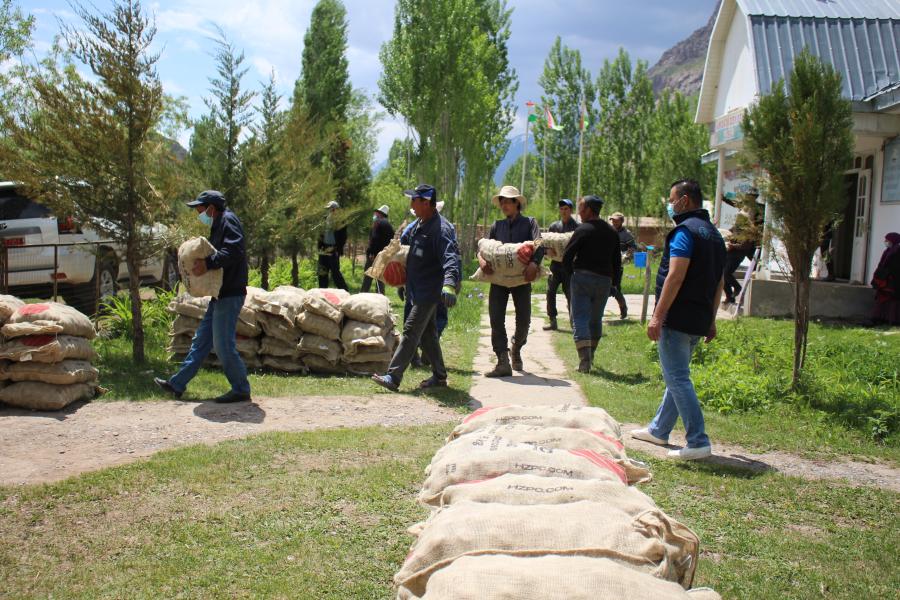Smallholder farmers in Tajikistan received 100 tonnes of high quality potato seed
25 May 2021
25 May 2021, Dushanbe – Today, the Food and Agriculture Organization of the United Nations (FAO) in collaboration with Japan International Cooperation Agency (JICA) and Ministry of Agriculture of the Republic of Tajikistan concluded the distribution of 100 tonnes of high quality potato seed to smallholder farmers to strengthen the potato seed production system in Tajikistan. The activity covered potato producers in Nurobod and Lakhsh districts of the Rasht Valley, Devashtich and Mastchohi Kuhi districts of the Sughd region, Vanj and Darvoz districts of the GBAO, as well as Khovaling district of the Khatlon region.

This initiative should give farmers access to good quality potato seeds – a critical agricultural input – and thus improve livelihoods by increasing yields and advancing production practices, which will lead to further enhancing agribusinesses in Tajikistan. Developing the system of seed replenishment at the grass-roots level through connecting smallholder producers to cooperatives and seed distributors is very critical.
The provision of high yield potato seeds for small-scale farmers will not only contribute to increased productivity of the value chain for potato seeds, but also the potatoes produced will be available for local consumption, which will improve food security and nutrition of rural populations. Moreover, it will contribute to create a strong and reliable network of key actors for an efficient and effective potato production through a better understanding on how replenishment of seed stock functions and what improvements are needed in the institutional system.
“Having geographical advantage, Tajikistan has a great potential in the production of potato seeds in Central Asia, and with the rational utilization of the existing resources this country can become the hub of high quality potato seed producer and even exporter of potato seed in the region. However, due to the pandemic, we understand the seeds became not widely available in the country and we wanted to support the farmers by providing potato seeds, fertilizers and organize trainings to strengthen technical capacity of the farmers,” emphasized Kikuchi Takeshi, Representative of JICA Tajikistan office.
Last year, the first sowing campaign of seed potatoes under a joint FAO-European Union project allowed farmers to reap a good harvest in August-September, particularly in Nurabad district of Rasht valley.
“With this support, Tajikistan has a unique opportunity to establish an economically viable, resource efficient, and environmentally sustainable production system for seed potato to supply quality seeds for farmers in Tajikistan and in the neighboring countries,” said Oleg Guchgeldiyev, FAO Representative in Tajikistan. “FAO has a remarkable experience and expertise in piloting innovative approaches to produce seed potatoes in Tajikistan. Last year’s experience demonstrated that farmers can improve production quality and quantity, through following the technology and tracking system developed and introduced by FAO.”
“The replenishment of seed stock in the country with high quality seeds will provide the smallholder farmers with better utilization of agricultural inputs and efficient land use via improved productivity,” he added.
There are existing challenges that prevent farmers from benefitting from potato production. Low quality seeds decreases harvest potential and farmers’ income. Better supply and access to high quality seed potato is very important to improve potato production and productivity. In addition, good farming practices for both seed and table potato, including favourable conditions to select quality seed and production practices, as well as postharvest handling and storage can play a major role and should be well understood and routinely applied by producers and processors.
This activity is part of a pilot project for agribusiness development in Tajikistan, funded by Japan International Cooperation Agency (JICA) and regional project on lifecycle management of pesticides and disposal of persistent organic pollutant pesticides in Central Asian countries and Turkey, funded by the Global Environment Facility.

